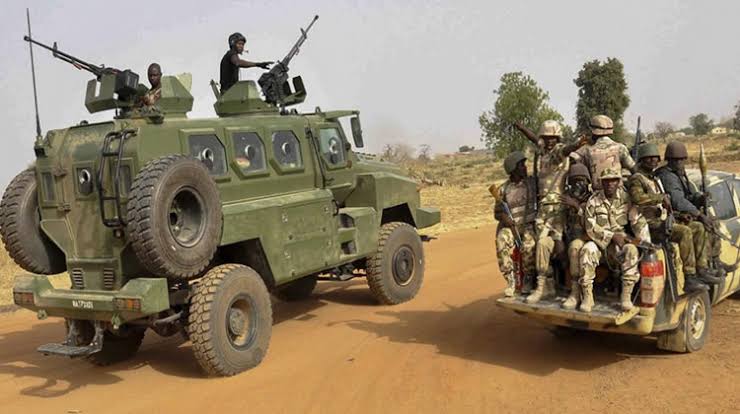The Nigerian Army’s Operation Hadin Kai has struck a significant blow against Boko Haram, neutralizing at least 60 terrorists in a fierce overnight battle in Bita, a known insurgent stronghold in southern Borno State. This operation, described by military sources as one of the most devastating strikes against the terrorist group in recent times, underscores the Nigerian military’s renewed resolve to dismantle terrorist networks and restore peace to the troubled northeast region.
A Coordinated Land and Air Assault
The operation, which unfolded in the early hours of Friday, May 30, 2025, involved a meticulously planned joint offensive by ground forces from the 26 Task Force Brigade of Sector One and the Air Component of Operation Hadin Kai. According to counterinsurgency expert Zagazola Makama, the engagement began at approximately 1:09 a.m. when Boko Haram insurgents launched a surprise assault on the troops’ defensive positions in Bita. The terrorists, likely aiming to overrun the military outpost, were met with an immediate and overwhelming response from the Nigerian forces.
The ground troops, supported by rapid reinforcements, engaged the insurgents in a grueling firefight that lasted over two hours, until around 3:23 a.m. The Nigerian Air Force played a pivotal role, deploying A-29 Super Tucano aircraft and the Dragon platform to deliver precision airstrikes. These strikes not only disrupted the terrorists’ advance but also destroyed two enemy gun trucks and inflicted heavy casualties. At least 60 terrorists were confirmed killed in the initial exchange, with blood trails and abandoned equipment suggesting additional losses among the fleeing insurgents.
Strategic Importance of Bita
Bita, located in southern Borno State, has long been a strategic hub for Boko Haram and its splinter faction, the Islamic State West Africa Province (ISWAP). The area’s dense terrain and proximity to the Sambisa Forest have made it a haven for insurgents to regroup, plan attacks, and store logistics. The Nigerian military’s decision to target Bita reflects a broader strategy to disrupt terrorist supply lines and safe havens, which have fueled the insurgency’s persistence in the region.
The operation’s success is particularly significant given the recent resurgence of Boko Haram and ISWAP activities in Borno State. Over the past year, the groups have intensified attacks on both military and civilian targets, exploiting gaps in security coverage. Just days before the Bita offensive, on May 27, 2025, insurgents launched a deadly ambush in Marte, killing nine members of the Civilian Joint Task Force (CJTF) and two soldiers in a separate attack on New Marte. These incidents highlight the ongoing threat posed by the insurgents and the critical need for robust counterterrorism operations.
Military Leadership and Tactical Evolution
The Bita operation comes at a time when the Nigerian Army is undergoing a strategic overhaul under the leadership of Lieutenant General Olufemi Oluyede, who has been actively engaged in field assessments since taking command. Over the past three days, General Oluyede has been at the frontline, meeting with field commanders and troops to enhance coordination and operational synergy. His hands-on approach signals a commitment to addressing the challenges posed by the insurgency head-on.
The success in Bita also highlights the Nigerian military’s growing reliance on joint operations, combining ground assaults with air support to maximize impact. The use of advanced platforms like the A-29 Super Tucano and real-time intelligence, surveillance, and reconnaissance (ISR) capabilities demonstrates a tactical evolution in the fight against terrorism. The destruction of terrorist logistics bases in Bita further weakens their operational capacity, disrupting their ability to sustain prolonged campaigns.
Challenges and the Road Ahead
While the neutralization of 60 terrorists marks a significant victory, the broader conflict remains far from over. The loss of two soldiers in a related attack in New Marte on May 27 serves as a somber reminder of the sacrifices made by Nigeria’s security forces. Moreover, the insurgents’ use of advanced tactics, such as armed drones and vehicle-borne IEDs, suggests they are adapting to military pressure, possibly with external support from groups like the Islamic State.
Security analysts emphasize the need for a multifaceted approach to defeat Boko Haram and ISWAP. Hamisu Sani, a security expert, told the BBC that while the insurgents can be weakened, completely eradicating them requires sustained military pressure, improved intelligence, and regional cooperation. The withdrawal of Niger’s troops from the Multinational Joint Task Force (MNJTF) has further complicated efforts, underscoring the importance of collaboration with neighboring countries like Chad and Cameroon.
Join our Whatsapp channel to stay updated always!


